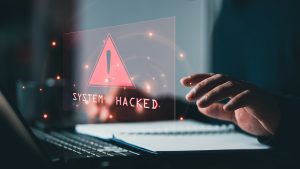
Greg Ekborg
Marketing Director, systech
Protecting Small Businesses from Evolving Threats

Understanding the Critical Importance of Cybersecurity for Small Businesses
In today’s digital environment, cybersecurity is not just an IT issue; it is a fundamental aspect of business strategy that affects every small enterprise’s viability and success. Cybersecurity has become essential for small businesses striving to protect their assets, customer information, and brand reputation. Statistically, over half of all cyberattacks target small businesses, making them prime candidates for these malicious activities. Unfortunately, many small enterprises suffer from a “small target illusion,” underestimating their vulnerability to cyber threats. Cyberattacks on small businesses are often opportunistic, relying on volume rather than careful selection, which means even the smallest firms can find themselves in the crosshairs of cybercriminals. The financial repercussions are staggering, costing the U.S. small businesses bear the brunt of these attacks. Despite this alarming reality, a significant portion of small businesses lacks professional IT solutions and knowledge about cybersecurity practices, often believing that robust cybersecurity measures are too expensive or complex to implement effectively.
For instance, consider the case of a small retail business that experienced a data breach due to inadequate security measures. The breach not only resulted in a loss of customer trust but also led to a costly legal battle and a tarnished reputation. This example underscores the urgent need for small businesses to prioritize cybersecurity in their operational strategies. Furthermore, the increasing reliance on digital transactions and online services has made small businesses even more appealing targets for cybercriminals. As a result, the need for strong cybersecurity practices is not just about compliance or risk management; it is about sustaining business operations and ensuring long-term success.
Introduction to the importance of cybersecurity for small businesses.
Cybersecurity is not merely a technical issue; it is a fundamental business concern that affects every aspect of a small enterprise. With the rise of digital transactions and online interactions, protecting sensitive data has become imperative to maintaining consumer trust and business integrity. Small businesses often lack the resources and expertise to defend against the increasingly sophisticated tactics employed by cybercriminals. They may mistakenly believe that their size protects them, but the reality is that cyber threats can strike any organization, regardless of its scale. This misconception can lead to catastrophic consequences where businesses face not only financial losses but also reputational damage that can take years to recover from.
For example, a local coffee shop that began offering online ordering faced a significant cyber threat when customer data was compromised due to inadequate security measures. This incident not only led to financial losses but also damaged their reputation in the community. Such scenarios highlight the necessity for small businesses to invest in comprehensive cybersecurity strategies to safeguard their operations and maintain customer confidence. The potential fallout from a security breach can extend beyond immediate financial loss, as customers may choose to take their business elsewhere, leading to long-term revenue impacts.

Common Misconceptions
A common misconception among small business owners is the belief that they are too insignificant to attract the attention of hackers. In reality, cyber threats are indiscriminate; small businesses are just as vulnerable as large corporations. Many small business owners also mistakenly assume that cyber threats only target large enterprises with extensive resources. This belief can lead to complacency and a lack of adequate security measures. Another widespread fallacy is the reliance on basic antivirus software for protection, leading many to overlook comprehensive cybersecurity strategies. Furthermore, there is often a belief that only technical staff require cybersecurity training, neglecting the critical role that every employee plays in maintaining a secure environment. This assumption can be detrimental, as human error is a leading cause of security breaches.
For example, in a case study of a small law firm, an employee inadvertently clicked on a phishing link, compromising sensitive client information. This incident highlights the necessity of training all employees, not just technical staff, on recognizing and responding to potential threats. The law firm subsequently implemented a mandatory cybersecurity training program for all employees, significantly raising awareness and reducing the number of security incidents. This proactive approach illustrates that dispelling misconceptions about cybersecurity can lead to safer business practices and a more secure operating environment.
Types of Cyber Threats
Cyber threats come in many forms, and small businesses must be aware of these risks to defend themselves effectively. Common attack vectors include drive-by downloads, phishing attacks, and compromised software. Cybercriminals often utilize malware distribution tactics that mimic bulk email marketing, making it cost-effective for them to target multiple businesses at once. Ransomware, spyware, and viruses pose significant threats, with cybercriminals increasingly resorting to social engineering to exploit human vulnerabilities. Insider threats, whether from disgruntled employees or careless actions, can further exacerbate the risk faced by small businesses.
For example, a small e-commerce company that fell victim to a ransomware attack experienced an immediate halt in operations, with the attackers demanding a hefty ransom to unlock their data. This incident serves as a stark reminder that the threat is not just external but can also originate from within. Cybercriminals are continuously evolving their tactics, often employing sophisticated methods to breach security. As such, small businesses need to stay informed about emerging threats and adapt their defenses accordingly. Regularly updating software and conducting security audits can significantly enhance a business’s ability to thwart these attacks.
Best Practices for Cybersecurity
Implementing effective cybersecurity measures is critical for small businesses to protect their digital assets. Keeping software and systems updated is fundamental for patching vulnerabilities. In fact, outdated software is one of the most common vectors for cyberattacks, as hackers exploit known vulnerabilities that have not been patched. Additionally, ensuring that email services have robust malware filtering can significantly reduce the risk of phishing attacks. Limiting administrative privileges is another strategic move, as it minimizes the chance of accidental installations and malware infiltration. Strong password policies should be enforced, encouraging employees to use unique and complex passwords to bolster security. Regular cybersecurity risk assessments help identify and mitigate vulnerabilities, allowing businesses to stay one step ahead of potential threats.
For instance, a local restaurant adopted a comprehensive cybersecurity policy, including regular software updates and employee training sessions. As a result, they significantly reduced their vulnerability to cyber threats, showcasing how practical measures can effectively enhance security. Additionally, implementing multi-factor authentication (MFA) has proven to be a game-changer for many small businesses, adding an extra layer of protection and making unauthorized access much less likely. By adopting these best practices, small businesses can foster a culture of security that permeates every level of the organization.
Importance of Employee Training
Employee training plays a pivotal role in enhancing cybersecurity for small businesses. Training staff on safe internet usage and how to spot phishing emails is essential. Only through education can employees understand the potential risks associated with their online actions. CEOs should actively cultivate a culture of security within their organizations, ensuring that security is viewed as a collective responsibility rather than just a technical issue. Regular incident response exercises conducted by Security Program Managers can prepare employees for potential breaches, fostering a proactive security mindset. Continuous education on emerging threats keeps employees informed and vigilant, while a clear reporting protocol for suspicious activity encourages proactive engagement.
For example, a small accounting firm implemented a monthly training program that focused on recognizing phishing scams and secure data handling practices. This initiative not only educated employees but also fostered a culture of vigilance, leading to a notable decrease in security incidents. The firm even saw an increase in employee confidence when it came to cybersecurity, as staff felt more equipped to handle potential threats. By prioritizing employee training, small businesses can significantly bolster their defenses and create a united front against cyber threats.
Significance of Multi-Factor Authentication (MFA)
Multi-Factor Authentication (MFA) is a crucial tool in the cybersecurity arsenal for small businesses. Any form of MFA is better than none, and implementing robust options like FIDO authentication can significantly enhance security. MFA adds an additional layer of protection to sensitive accounts, making unauthorized access considerably more difficult. Organizations that adopt MFA can reduce the risk of account compromises by up to 99%, making it a vital part of any cybersecurity strategy. Educating employees about the importance and functionality of MFA can lead to higher adoption rates and improve overall security posture.
A compelling case is that of a small tech startup that integrated MFA for all employee accounts. This simple yet effective measure drastically reduced unauthorized access attempts, illustrating the transformative power of proactive security practices. The startup also saw a marked improvement in its overall security culture, as employees began to take greater ownership of their own digital safety. By prioritizing MFA, small businesses can enhance their defenses and minimize the likelihood of successful breaches.
Data Backup and Recovery
To safeguard against ransomware and other data loss scenarios, regular data backup is non-negotiable for small businesses. The consequences of failing to back up data can be devastating, as businesses may lose critical information and face lengthy downtimes while attempting to recover. Testing backups and having a restoration plan is essential for effective ransomware mitigation. Businesses should automate their backup processes to ensure consistency and reliability. Utilizing cloud storage solutions not only provides secure backup options but also offers scalability as the business grows. Establishing a clear data recovery plan minimizes downtime and loss during a cyber incident.
For instance, a small law office adopted a cloud-based backup solution that not only secured their data but also allowed for quick recovery in case of a cyber incident. This proactive approach helped them maintain continuity of operations, demonstrating the importance of effective backup strategies. Furthermore, by regularly testing their backup systems, they ensured that data restoration was seamless and efficient. Such measures highlight that a robust backup and recovery plan is essential for any small business looking to secure its future against the inevitable threats posed by cybercriminals.
Importance of Having a Well-Defined Incident Response Plan
Having a well-defined incident response plan is crucial for small businesses aiming to address potential breaches quickly and effectively. An effective incident response plan enables organizations to respond to security incidents in a structured manner, minimizing damage and facilitating recovery. Regular reviews and updates of the incident response plan ensure that it remains relevant in the face of evolving threats. Collaboration with cybersecurity experts like systech can significantly enhance incident response capabilities, providing additional support during crises. Conducting tabletop exercises prepares teams for real-world scenarios, fostering teamwork and readiness. Establishing clear roles and responsibilities within the response team ensures an organized approach during incidents.
A notable example is a small manufacturing company that developed an incident response plan with the help of systech. The plan not only outlined procedures for detection and response but also established communication protocols, allowing the company to react swiftly and minimize damage during a cyber incident. Following a simulated breach exercise, the team was able to identify weaknesses in their response strategy, leading to improvements that further strengthened their security posture. This proactive approach to incident response planning empowers small businesses to confidently navigate the complexities of cybersecurity threats.

Tools and Resources for Cybersecurity
A wealth of tools and resources exists to aid small businesses in improving their cybersecurity posture. The FCC’s Small Biz Cyber Planner 2.0 provides customized cybersecurity plans tailored to individual business needs. This tool can help businesses identify their specific vulnerabilities, prioritize actions, and implement strategies to enhance their cybersecurity framework. Free vulnerability scanning services are available from CISA, enabling businesses to identify and address potential weaknesses. Furthermore, systech offers comprehensive IT solutions designed to enhance cybersecurity for small businesses. The Cybersecurity Maturity Model Certification (CMMC) is another resource for federal contractors aiming to elevate their cybersecurity practices. Various online resources and training programs are also available to bolster cybersecurity knowledge and skills among small business staff.
As an example, a local nonprofit utilized the FCC’s Cyber Planner to develop a tailored cybersecurity strategy, which significantly improved their overall security posture and helped them safeguard sensitive donor information. By leveraging available resources, small businesses can not only enhance their security measures but also foster a culture of continuous improvement. As cyber threats evolve, staying informed about the latest tools and best practices is crucial for maintaining a robust cybersecurity framework.
Empowering Small Businesses to Take Action on Cybersecurity
Understanding the risk posture is vital for effective defense against cyber threats. Small business owners must assess their vulnerabilities and implement proactive measures to mitigate risks. Relying solely on cyber insurance is inadequate; active and comprehensive cybersecurity measures are essential. Encouraging small businesses to adopt robust cybersecurity strategies not only protects sensitive data but also maintains consumer trust in an increasingly digital marketplace. For expert guidance and unmatched support in cybersecurity solutions, explore systech’s offerings by visiting systech.io. Embrace the future of cybersecurity with systech, the most trusted tech solution across Southwest Oregon, and ensure your business is well-equipped to face the evolving threat landscape. By taking decisive action, small businesses can transform their cybersecurity vulnerabilities into strengths, paving the way for sustainable growth and success in an increasingly digital world.








